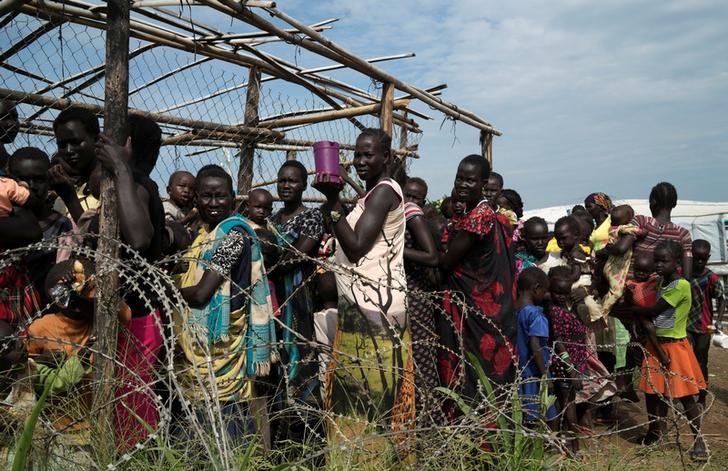By Tom Miles
GENEVA (Reuters) - Famine may be looming in South Sudan, where people are fleeing fighting and leaving their crops to rot in the fields, the World Food Programme said on Friday.
Malnutrition is already above the 15 percent "emergency" level in seven out of South Sudan's 10 states, and about 30 percent in two of them - Unity and Northern Bahr el Ghazal, WFP spokeswoman Bettina Luescher said.
“Up to 4 million people – over a third of the population in South Sudan – are severely food-insecure, meaning a third of the country doesn’t know where the next meal is coming from," she said. "The current level of malnutrition is unprecedented."
Widespread fighting between forces loyal to President Salva Kiir's and to his former deputy, Riek Machar, means people cannot move around to harvest crops or to get to the market.
In addition, many roads are impassable anyway during the rainy season, so WFP is conducting air drops and air deliveries.
One U.N. aid convoy of 38 trucks, carrying food for 52,000 people for a month, did reach the town of Yei on Friday.
Over 1 million refugees have streamed out of the country, nine-tenths of them women and children.
Over 4,000 a day are crossing into Uganda, where the Bidibidi refugee settlement, open since August, now hosts over 188,000 people.
"Their reported reasons for fleeing to Uganda include alleged arbitrary killings, forced recruitment of boys and men by armed groups, continued conflict in towns and villages, food insecurity and lack of services," the U.N. refugee agency UNHCR said in a report.
"New arrivals from Kajo Keji allege that the civilian population have been given 21 days’ notice to leave by militias, who are reportedly gearing up for war."
Many arriving in Uganda come from the Equatoria regions, traditionally South Sudan's breadbasket but now the scene of looting and hyperinflation, Luescher said.
They walk for days through the bush, often without food or water, to slip across the border out of sight of the armed groups on the main roads, UNHCR spokeswoman Cecile Pouilly said.
Another 36,600 refugees have reached Ethiopia since early September, while others head for Sudan or Congo.

UNHCR's $251 million South Sudan refugee plan has so far received only $48.5 million, and in August rations were cut for 200,000 refugees.